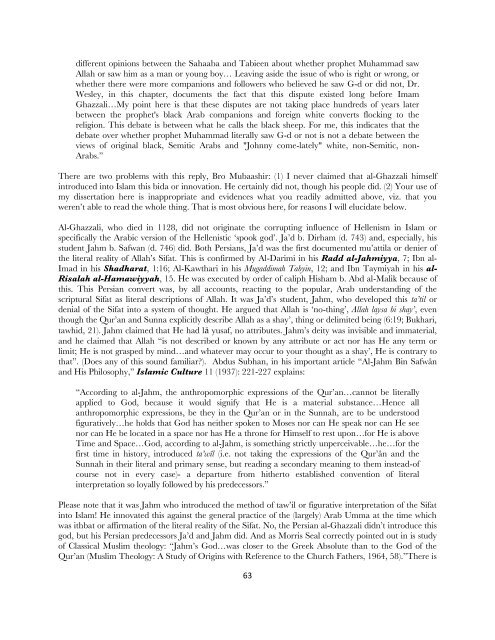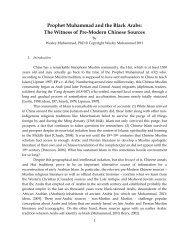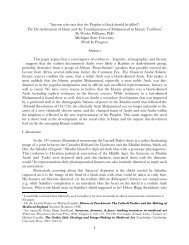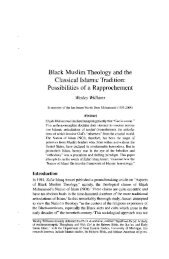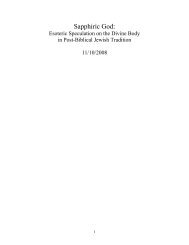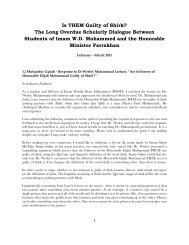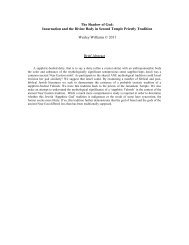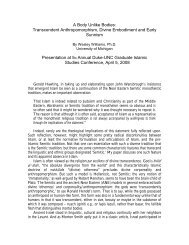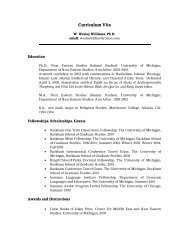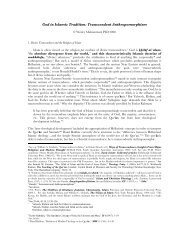Is THEM Guilty of Shirk? - Dr. Wesley Muhammad
Is THEM Guilty of Shirk? - Dr. Wesley Muhammad
Is THEM Guilty of Shirk? - Dr. Wesley Muhammad
You also want an ePaper? Increase the reach of your titles
YUMPU automatically turns print PDFs into web optimized ePapers that Google loves.
different opinions between the Sahaaba and Tabieen about whether prophet <strong>Muhammad</strong> saw<br />
Allah or saw him as a man or young boy… Leaving aside the issue <strong>of</strong> who is right or wrong, or<br />
whether there were more companions and followers who believed he saw G-d or did not, <strong>Dr</strong>.<br />
<strong>Wesley</strong>, in this chapter, documents the fact that this dispute existed long before Imam<br />
Ghazzali…My point here is that these disputes are not taking place hundreds <strong>of</strong> years later<br />
between the prophet's black Arab companions and foreign white converts flocking to the<br />
religion. This debate is between what he calls the black sheep. For me, this indicates that the<br />
debate over whether prophet <strong>Muhammad</strong> literally saw G-d or not is not a debate between the<br />
views <strong>of</strong> original black, Semitic Arabs and "Johnny come-lately" white, non-Semitic, non-<br />
Arabs.‖<br />
There are two problems with this reply, Bro Mubaashir: (1) I never claimed that al-Ghazzali himself<br />
introduced into <strong>Is</strong>lam this bida or innovation. He certainly did not, though his people did. (2) Your use <strong>of</strong><br />
my dissertation here is inappropriate and evidences what you readily admitted above, viz. that you<br />
weren‘t able to read the whole thing. That is most obvious here, for reasons I will elucidate below.<br />
Al-Ghazzali, who died in 1128, did not originate the corrupting influence <strong>of</strong> Hellenism in <strong>Is</strong>lam or<br />
specifically the Arabic version <strong>of</strong> the Hellenistic ‗spook god‘. Ja‘d b. Dirham (d. 743) and, especially, his<br />
student Jahm b. Safwan (d. 746) did. Both Persians, Ja‘d was the first documented mu‘attila or denier <strong>of</strong><br />
the literal reality <strong>of</strong> Allah‘s Sifat. This is confirmed by Al-Darimi in his Radd al-Jahmiyya, 7; Ibn al-<br />
Imad in his Shadharat, 1:16; Al-Kawthari in his Mugaddimah Tabyin, 12; and Ibn Taymiyah in his al-<br />
Risalah al-Hamawiyyah, 15. He was executed by order <strong>of</strong> caliph Hisham b. Abd al-Malik because <strong>of</strong><br />
this. This Persian convert was, by all accounts, reacting to the popular, Arab understanding <strong>of</strong> the<br />
scriptural Sifat as literal descriptions <strong>of</strong> Allah. It was Ja‘d‘s student, Jahm, who developed this ta‟til or<br />
denial <strong>of</strong> the Sifat into a system <strong>of</strong> thought. He argued that Allah is ‗no-thing‘, Allah laysa bi shay‟, even<br />
though the Qur‘an and Sunna explicitly describe Allah as a shay‘, thing or delimited being (6:19; Bukhari,<br />
tawhid, 21). Jahm claimed that He had lā yusaf, no attributes. Jahm‘s deity was invisible and immaterial,<br />
and he claimed that Allah ―is not described or known by any attribute or act nor has He any term or<br />
limit; He is not grasped by mind…and whatever may occur to your thought as a shay‘, He is contrary to<br />
that‖. (Does any <strong>of</strong> this sound familiar?). Abdus Subhan, in his important article ―Al-Jahm Bin Safwân<br />
and His Philosophy,‖ <strong>Is</strong>lamic Culture 11 (1937): 221-227 explains:<br />
―According to al-Jahm, the anthropomorphic expressions <strong>of</strong> the Qur‘an…cannot be literally<br />
applied to God, because it would signify that He is a material substance…Hence all<br />
anthropomorphic expressions, be they in the Qur‘an or in the Sunnah, are to be understood<br />
figuratively…he holds that God has neither spoken to Moses nor can He speak nor can He see<br />
nor can He be located in a space nor has He a throne for Himself to rest upon…for He is above<br />
Time and Space…God, according to al-Jahm, is something strictly unperceivable…he…for the<br />
first time in history, introduced ta‟wîl (i.e. not taking the expressions <strong>of</strong> the Qur‘ân and the<br />
Sunnah in their literal and primary sense, but reading a secondary meaning to them instead-<strong>of</strong><br />
course not in every case)- a departure from hitherto established convention <strong>of</strong> literal<br />
interpretation so loyally followed by his predecessors.‖<br />
Please note that it was Jahm who introduced the method <strong>of</strong> taw‘il or figurative interpretation <strong>of</strong> the Sifat<br />
into <strong>Is</strong>lam! He innovated this against the general practice <strong>of</strong> the (largely) Arab Umma at the time which<br />
was ithbat or affirmation <strong>of</strong> the literal reality <strong>of</strong> the Sifat. No, the Persian al-Ghazzali didn‘t introduce this<br />
god, but his Persian predecessors Ja‘d and Jahm did. And as Morris Seal correctly pointed out in is study<br />
<strong>of</strong> Classical Muslim theology: ―Jahm‘s God…was closer to the Greek Absolute than to the God <strong>of</strong> the<br />
Qur‘an (Muslim Theology: A Study <strong>of</strong> Origins with Reference to the Church Fathers, 1964, 58).‖There is<br />
63


